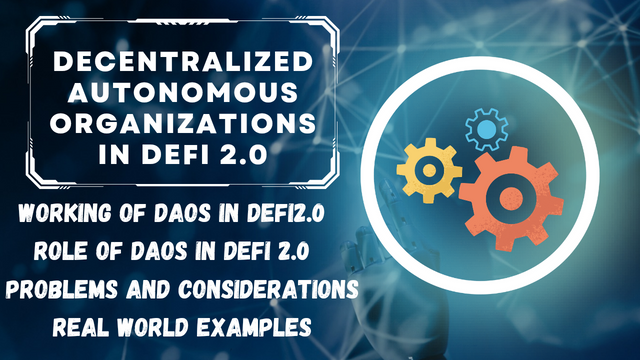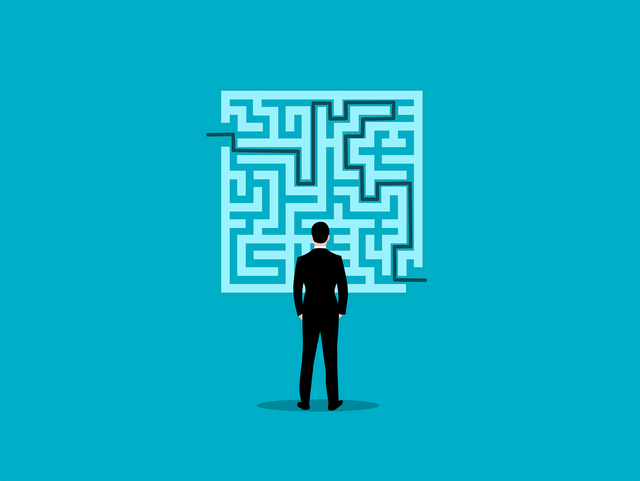How Decentralized Autonomous Organizations (DAOs) Revolutionize DeFi 2.0
Decentralized finance (DeFi) has been changing very quickly and this has brought about a new phase of financial invention. The development is based on the decentralized autonomous organizations (DAOs), which are helpful in reforming governance within DeFi 2.0. In this today's post I will be covering the basic structure and design of the DAOs as well as their influence in the DeFi 2.0 that shows how the DAOs and DeFi 2.0 work together and shape the next generation DeFi.

Understanding DAOs and Their Working
DAOs are self governing groups that operate on blockchain platforms and follow pre-programmed rules called smart contracts which employ consensus mechanisms. Instead of having central authorities like traditional establishments DAOs work through distributed decision making processes which allows every person to take part in voting or proposing changes collectively.
Smart contracts lie at the heart of every DAO because they contain the organization’s rules in code form while also automating different operations such as voting systems, investment management structures among others including reward distributions all these ensure transparency, immutability and trust to enable a truly decentralized way of running things. All these features are used in the DeFi 2.0 to make it more reliable and transparent.
Role of DAOs in DeFi 2.0
Decentralized Governance: Community members are empowered to participate in decision making processes through DAOs by ensuring inclusivity and transparency in DeFi 2.0.
Efficiency and Automation: Governance functions are automated by smart contracts which reduces human interaction as well as potential for manipulation or corruption in the DeFi 2.0.
Global Accessibility: Anyone with an internet connection can take part in governance activities on DAOs because they operate on blockchain networks regardless of their location. It makes it possible for everyone to use DeFi 2.0 worldwide.
Incentivization: Participation is often encouraged through token rewards thereby aligning stakeholder interests with organization’s long-term success.
Problems and Considerations of Using DAOs in DeFi 2.0

In spite of the numerous benefits that come with adopting distributed autonomous organizations in DeFi 2.0 there are also some challenges of using decentralized autonomous organizations in the DeFi 2.0 such as:
Regulatory Uncertainty: Compliance and legal frameworks may be difficult to implement in the DeFi 2.0 due to ongoing changes within regulatory systems related to this technology.
Security Risks: There is need for rigorous auditing alongside security measures because smart contracts have weaknesses which can be exploited by malicious actors. So it is necessary to use DAOs in the DeFi 2.0 carefully with the complete verification and checking.
Governance Participation: It is not easy to get many people involved into governing a system like this one since it requires active participation from the community itself.
Real World Examples
The DAO: In 2016, the DAO was hacked. However, its failure led to future development in this area and demonstrated how powerful it can be to crowdfund things through decentralized organizations.
MakerDAO: MakerDAO is considered one of the first DeFi projects. They created a decentralized stablecoin (Dai). They introduced protocol that governs it and this protocol is known as Maker Protocol. This allows token holders to vote on the proposals and about the transactions fees. The Dia token is used for the transaction fees in the DeFi.
Uniswap: Uniswap recently released its own governance token UNI which gives holders the ability to shape the direction of the protocol as well as earn part of fees collected from its used.
Conclusion
Decentralized Autonomous Organizations or DAOs offer a new democratic and transparent governance system for DeFi 2.0. In DeFi 2.0 especially they help to strengthen the communities. The DAOs allow people to come together and decide what they want from them in the DeFi 2.0. But this is only just the beginning. It has revolutionized the DeFi 2.0. And it can be wisely used in other systems as well such as in the insurance and supply chain management. The DAOs enable all the community members to reshape the DeFi 2.0 governance and work collectively. The DeFi 2.0 has become a global product and more transparent because of the involvement of the decentralized autonomous organizations.
Thank you, friend!


I'm @steem.history, who is steem witness.
Thank you for witnessvoting for me.
please click it!
(Go to https://steemit.com/~witnesses and type fbslo at the bottom of the page)
The weight is reduced because of the lack of Voting Power. If you vote for me as a witness, you can get my little vote.
https://twitter.com/suboohi/status/1785506965407363143?t=DcuuRPbd2rZiBAeoDJSbXA&s=19
Note:- ✅
Regards,
@jueco